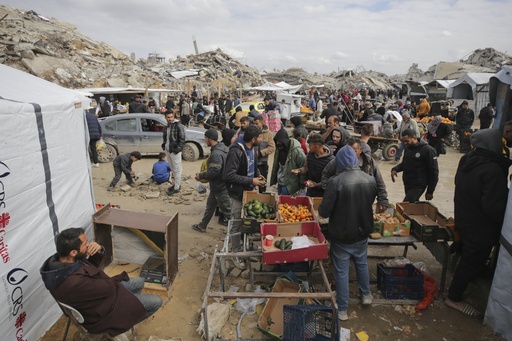
Hamas has announced the names of three Israeli hostages slated for release this weekend as part of the ongoing ceasefire agreement with Israel, signaling that the arrangement is progressing as intended. However, concerns persist among observers regarding U.S. and Israeli strategies aimed at displacing Palestinians from Gaza, which may jeopardize the truce.
The announcement on Friday came after Hamas claimed that Israel was overly restricting essential humanitarian aid from entering the Gaza Strip during the ceasefire. They alleged that vital supplies, including tents, fuel, and debris clearing equipment, were not reaching those in need. Israel has yet to respond to these claims regarding potential violations of the ceasefire terms.
In related regional news, Iran’s supreme leader criticized U.S. negotiations, deeming them “not intelligent, wise, or honorable.” This followed comments from U.S. President Donald Trump expressing interest in nuclear talks with Tehran, despite previously reimposing pressure on Iran through sanctions. The future of these discussions is uncertain, as Ayatollah Ali Khamenei refrained from explicitly forbidding engagement with the United States.
The father of two of the youngest Israeli hostages in Gaza has voiced an emotional appeal for the return of all captives. Yarden Bibas, who was released in a previous exchange, stated that “everything here is dark” without his family at home. His statement follows news that Hamas has identified three additional adult hostages to be released on Saturday. Bibas mentioned how his life remains incomplete until his family, which includes his wife and young sons, returns safely from Gaza.
Meanwhile, President Trump has made headlines by proposing that areas in Gaza could be redeveloped and residents resettled, describing it as a straightforward “real estate transaction.” This proposal has faced considerable backlash, although Trump insists it has received international approval. He noted that the resettlement might be permanent, a claim countered by officials within his administration.
In the face of escalating tensions, Lebanese President Joseph Aoun and Syria’s interim President Ahmad al-Sharaa have agreed to work together to manage ongoing border conflicts to protect civilian safety. Recent clashes between Syrian security forces and Lebanese clans have resulted in casualties as the two nations confront issues tied to smuggling and militant activity along their borders.
As Hamas moves forward with its plan to release the next group of hostages, this will mark the fifth round of exchanges since the ceasefire commenced last month. The Palestinian prisoners set for release include those sentenced to life as well as a number held without trial in connection to the recent conflict. The specific individuals named for release have been confirmed by an Israeli official, including Eli Sharabi, Ohad Ben Ami, and Or Levy—each with personal stories reflecting the tragedy of the ongoing situation.
Shortly before these hostages’ release, Hamas reiterated allegations that Israel has not fulfilled its commitments related to humanitarian aid under the ceasefire agreement. They claimed that the quantity of necessary supplies entering Gaza has not met expectations. While aid deliveries have occurred, reports from humanitarian workers indicate that there are ongoing restrictions affecting the necessary resources to support the population’s needs.
In other developments, a U.S. envoy stated that formal action would be taken to ensure that Hezbollah does not have a role in Lebanon’s new government, asserting that the militant group should not be allowed to influence state matters. The response from Lebanon’s presidency was dismissive, emphasizing that such statements reflect the envoy’s personal views rather than the Lebanese government’s stance.
The ongoing conflict has also drawn attention to the relationship between Israel and the International Criminal Court (ICC), with Israel’s foreign minister supporting U.S. sanctions against the court, describing its actions as unjust and a threat to Israeli leadership. Concurrently, the ICC condemned the U.S. sanctions, stating that they disrupt its ability to execute impartial judicial work and calling upon member states to oppose such actions.
Finally, in a recent twist in geopolitical dynamics, Iran’s supreme leader reiterated that negotiations with the U.S. were not favorable, contradicting earlier signals from Tehran suggesting a willingness to discuss its nuclear program in exchange for sanction relief. This contradiction has resulted in considerable uncertainty regarding Iran’s future diplomatic approach, particularly as it has faced multiple military setbacks in the region.
In a symbolic moment, Hamas held a funeral for its deputy leader killed last year, reflecting the group’s ongoing resistance. Additionally, Israeli military operations have continued, claiming strikes on sites associated with Hezbollah, raising questions on their compliance with the existing ceasefire.

